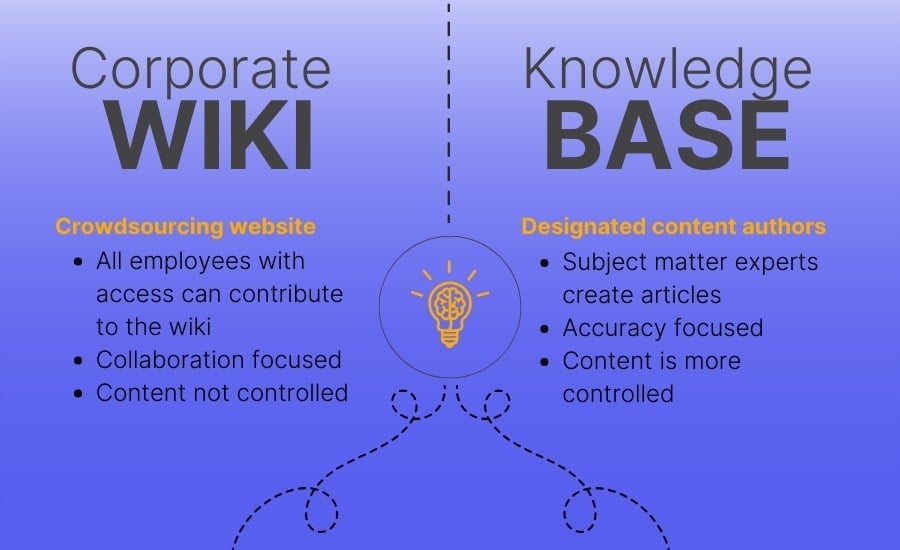Corporate Wiki vs Knowledge Base: Which Do You Need?
Who should document your company’s knowledge?
When you are comparing getting a corporate wiki or a knowledge base, that’s really the question you are trying to answer.
Both solutions are used to manage and transfer knowledge. They both gather your company resources in one location.
So, which do you need for your company?
As the Head Consultant at ScreenSteps — a knowledge ops solution that includes knowledge base software — I have explored many wikis and knowledge bases. I’ve realized that while the differences between a wiki and a knowledge base are subtle, they are important when deciding for your company.
To help you figure out whether a corporate wiki or a knowledge base is the best approach for your company, here is a detailed comparison of how the two software programs manage knowledge.
Table of Contents
Corporate wiki vs. knowledge base: The main difference

The difference between a corporate wiki and a knowledge base is in their roles and how each collects knowledge.
A corporate wiki is an all-inclusive approach to managing knowledge. It’s like a rec league sport — everyone who wants to participate can. It doesn’t matter what your title is at your company. You have an equal opportunity to write and edit content in your wiki.
That’s because the main purpose of a corporate wiki is collaboration. It’s a collaborative way to collect information.
A knowledge base is more of a competitive sports approach. While you don’t need to be an Olympic athlete to create content, you want to be a top performer to be a content contributor. With a knowledge base, subject matter experts create the knowledge base articles.
This content is controlled and reviewed to provide a consistent and accurate experience for your end-users.
What is a corporate wiki?
A corporate wiki is a website — either private or public — that a company uses so employees can collaborate on documenting company resources. It can also be called a company wiki or internal wiki.
The purpose of a wiki is to provide employees an opportunity to crowdsource their knowledge.
With a corporate wiki, employees collaborate by adding notes and changes to articles. It is a knowledge management approach that allows every member of your team to provide input.
Corporate wiki example: Wikipedia

Think of one of the most infamous wikis — Wikipedia. If you’ve used Wikipedia, you’ve at least used a wiki to read. Wikipedia is a collection of knowledge from all the users on the internet. Anyone can make edits or add information to an article.
The difference between Wikipedia and a corporate wiki is that you need to be an employee at your business to edit the documents in your corporate wiki.
Essentially, a wiki could be considered a forum. Everyone has a voice and shares their knowledge in one online grand hall.
Common features of a corporate wiki
Ultimately, the advantage of a corporate wiki is that it provides a centralized hub for your company’s knowledge. The other major advantage of a wiki is that anyone in your company can contribute to it.
With that in mind, here are some of the main features you’ll want your corporate wiki to include:
- A cloud-based website
- Collaborative editing that allows simultaneous work by users
- Web authoring tools
- Document upload capabilities
- Document interlinking
- Organization structure
- Security features
6 pros of a corporate wiki
There are many advantages of having a wiki as part of your company’s knowledge management plan. Some of the benefits of having a corporate wiki include:
1. A centralized hub for your knowledge
As mentioned above, a wiki provides a singular location to store your company’s resources. Your entire team knows where to turn to find answers and resources to their questions.
There’s no need for your employees to search through emails, messages, desktop folders, etc. to find what they need. It’s all in your wiki.
2. Everybody can contribute to the content
With a wiki, the responsibility to create resources — such as how-to guides, reference sheets, etc. — doesn’t fall on one person. Everyone in the company can upload documents, add information, and edit articles.
3. Simple editor
Wiki content creation tools are simple. Since the focus is to allow everyone a chance to craft articles, the editor is usually similar to other common authoring programs.
4. You can gather more information in less time
Because multiple people can work on one article, it takes less time to build an article in your wiki. You can assign different steps in a procedure or sections in a policy to different employees.
5. Simple to set up
Setting up your wiki doesn’t take a lot of time. The website is formatted to help you organize articles and grant everyone access to those articles.
6. Linked resources
Help the readers know what to do without needing to explain every little detail in every article. Interlink your different resources. Then your employees can click on a link to get additional details about a policy, procedure, or additional information.
6 cons of a corporate wiki
While a wiki is a great tool for collaboration and centralizing company knowledge, corporate wikis have a few shortcomings. Here are 6 challenges when you use a wiki to manage your company knowledge.
1. Your content can easily become inaccurate
Have you heard the phrase, “There are too many cooks in the kitchen”?
When everyone can have a hand in editing a single article, it can easily become more of a mess than a unified resource for your end-users. That’s because bias and opinion sneak into “how things should be done.”
It’s a collection of tribal knowledge instead of a sure explanation from an expert.
2. You accidentally duplicate effort
When you allow everyone to write and edit articles, you'll most likely find duplicate articles for the same policy or procedure in your wiki. That means your company is paying two separate people to do the same work. (As long as the two articles match.)
3. Nobody owns the content
While you can have employees appointed to oversee and manage your wiki, that practice can diminish the role of the company wiki. If you have a manager saying what employees can and can’t do, it becomes less collaborative and the purpose of the wiki is lost.
4. Can lack organization
Collaboration is great. It is a good practice to allow your employees to have a voice in the company and to feel invested. However, when there are too many people building articles and structuring your wiki, things can get disorganized quickly.
5. Low search capabilities
Some company wikis don’t have a powerful search engine. That means despite having a wealth of information in your wiki, your employees aren’t able to use the search bar to find answers to their questions.
6. Articles are outside the workflow
Corporate wikis are websites for your company, which means you open your wiki in a separate web tab or window. In order for employees to follow a how-to guide in your wiki, they need to toggle back and forth between screens.
Cost
While there are free versions of wikis available, those typically have limited users, storage, or other limitations.
At the lowest point for paid wiki services, you can get corporate wikis starting at $5 per user per month. The cost of a wiki subscription is dependent on many different factors. Some of those factors include:
- Number of users
- Length of version history
- Which features are included
- Amount of cloud storage
When to use a corporate wiki
A good scenario for using a corporate wiki is, of course, when you want to collaborate with others. This especially applies when you have a small team of trusted individuals who are contributing to your company wiki.
It’s less advisable to use a corporate wiki when you have a large team of employees. Too many people — especially if they aren’t the experts — contributing to articles can cause confusion.
If your goal is to simply upload information and collaborate, a corporate wiki will help you achieve that goal. When your goal is to accumulate information, create consistency, and you don’t need as much control over the quality of the content, then a wiki will suffice.
If you don’t need to standardize procedures and you just want to collect knowledge, a wiki will help you in that gathering process.
Contradictorily, if you need the procedure to be done in one specific way, you need a platform where only your experts can author your guides.
What is a knowledge base?
A knowledge base is a software system that helps you manage your company knowledge and resources. The cloud-based software serves as a one-stop shop for all of your company’s information.
With a knowledge base, you can create, store, and share your information across your company. That information could include policies, procedures, how-to guides, reference sheets, and many other documents.
The content in your knowledge base is standardized. Subject matter experts create the guides so that they adhere to the company’s guidelines on how things should be done.
There are multiple types of knowledge base software options. The most common knowledge bases are internal and external knowledge bases. An internal knowledge base is for private usage in a company while an external knowledge base is a customer-facing resource.
🔎 Related: Knowledge Base Definition: What a Knowledge Base Is + Is Not
Features
Like all software, every knowledge base software company has its own set of unique features. However, there are some common features that help you identify a knowledge base.
Here are some of the common features you’ll find in knowledge base software:
- Authoring tools
- Article templates
- AI support (varies)
- Usage analytics and reports
- Viewing and authoring permissions
- Collaboration and feedback
- Integrations
- Version control
- Software security
- Video, gif, and image embed
5 pros of a knowledge base
Having a knowledge base to manage your company’s knowledge has its advantages. Some of the benefits of a knowledge base include:
1. Centralized hub for all your company knowledge
Like a wiki, a knowledge base is a centralized repository for all your company knowledge. Employees know exactly where to turn to get the answers they need.
2. Consistent experience
If you are in a customer-facing role, a knowledge base can help provide a consistent experience for your customers. That is because your guides are standardized, approved, and optimized by subject matter experts.
3. Shared information across knowledge bases
Many knowledge base software companies allow you to create both an internal and external knowledge base. Often, you have information and articles you can share on both your private and public knowledge base.
Some knowledge base systems allow you to share those articles instead of recreating them on different knowledge base sites. It can be as simple as clicking a button.
4. Better search engine
Generally speaking, knowledge bases are easier to search than a wiki. (Though, be cautious in your search because not all knowledge base software companies have a robust search engine.)
5. Improved employee efficiency and productivity
With guides that are easy to find and include accurate information, it helps employees improve efficiency and productivity. They can quickly find what they need and move on to their next task.
4 cons of a knowledge base
While a knowledge base has many benefits, there are challenges associated with managing a knowledge base. Those include:
1. It can be difficult to maintain
Your knowledge base is not a one-and-done project. You will constantly be adding new articles and updating existing ones.
You can’t just let your knowledge base sit. Just as your policies and procedures are constantly changing, so are your resources alongside them.
2. You need somebody to own it
You need an expert to make sure articles in your knowledge base are up-to-date with accurate information. This could be as simple as assigning content authors ownership of articles. They are then responsible for keeping those articles up to date with accurate information.
3. It can be expensive
To get knowledge base system that provides your end-users the best experience, you really need to pay for your software. That doesn’t have to be the most expensive subscription. There are plenty of affordable knowledge base services available, but you will need to budget for them.
CHECK IT OUT: Compare some of the best knowledge base systems here.
4. You need to train your employees on a new system
It takes time and training to teach your employees how to use your new knowledge base software. Depending on your knowledge base platform, it might not be as intuitive to create articles in your knowledge base system as in your wiki.
Cost
There is a wide range of pricing for using a knowledge base. Each knowledge base company charges differently, which can make pricing (and comparing pricing) confusing.
The cost of a knowledge base is dependent on multiple factors, including:
- Number of users
- Number of content authors
- Which features are included
- Number of articles
A common approach is cost per user per month. The range in price for a knowledge base is between $5/user per month up to more than $400/user per month. Most companies offer a discount for annual subscriptions.
There are some free knowledge base options available, but those typically come with limited capabilities and smaller teams.
When to use a knowledge base
If you have a single way to perform a procedure, you don’t need a wiki. You need a single article from your experts that other end-users can’t manipulate. You need a knowledge base.
Subject matter experts control the information in your knowledge base to prevent inaccurate and outdated information and instructions. Additionally, this prevents duplicate articles.
If you need your end-users to be able to find articles quickly and use them in the workflow, a knowledge base has more tools to put the answers at their fingertips.
If you want more insights into how your end-users are using your content, you’ll want a knowledge base. Some wikis have insights, but most knowledge base platforms have more reports.
Choose software that makes it easier for your content authors and end-users
Both a corporate wiki and a knowledge base serve a role in helping your manage your knowledge. While a wiki is great for gathering knowledge and collaboration, a knowledge base can help your employees perform procedures correctly with expert guides.
With a ScreenSteps knowledge base, you can manage who can author content in your knowledge base. That means, if you have a small trusted team, you can choose to have everyone contribute. If you have a large team, you can grant your experts or even your top-performing employees to write your guides.
It is fast and easy to author articles in ScreenSteps. You can save up to 75% of your time by using ScrenSteps content authoring tools. Plus, the robust search engine makes it easier for end-users to find the information they need.
Of course, there are dozens of knowledge base software companies out there. See this list of top knowledge base software companies on the market.
Want to see ScreenSteps in action?
Watch these pre-recorded demo videos to see how different features work in ScreenSteps.


.png)


